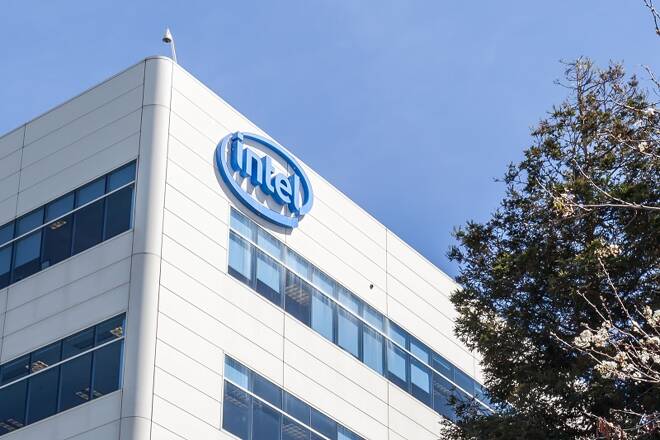Advertisement
Advertisement
Intel Downgrade Weighs on Major Indexes, Fed’s Bullard Sides With Trump on Tariffs
By:
“The positioning here is that the other countries are all free trade and the U.S. is not. If that’s really what we’re saying then just drop all tariffs and all nontariff barriers. Go down to zero. That would be better outcome for the whole world,” St. Louis Federal Reserve Bank President James Bullard.
After a two-sided pre-market trade, U.S. stocks opened slightly lower in the cash market, as weakness in shares of Intel raised concerns about the technology sector.
Intel dropped more than 1 percent on the opening after Barclays downgraded the company to equal weight from overweight, citing rising competition from rival chipmaker Advanced Micro Devices. The downgrade comes nearly two weeks after the company reported better-than-expected earnings.
The move in Intel is significant because the stock is part of all three major indexes – the Dow, S&P 500 Index and NASDAQ Composite Index. The overall stock market could tread water today if shares of Intel continue to weaken.
In the absence of fresh economic data on Monday, investors will be primarily focused on earnings as the second quarter season comes to a close. Among those reporting, Cardinal Health and Tyson Foods reported better-than-expected results. Warren Buffet’s Berkshire Hathaway posted stronger-than forecast quarterly profit on Friday, sending its Class B shares up by 2.6 percent.
According to FactSet, this earnings season has been stronger than analysts had expected. Of the S&P 500 companies that had reported through Friday, 80 percent have posted better-than-expected profits. Additionally, second-quarter earnings have grown by 24 percent through Friday, beating pre-season expectations of 20 percent growth.
Suggested Articles
- The Japanese Yen Loses its Safe Haven Status as China-US Trade Conflict Intensifies, Global Stocks Slightly Lower
- Gold Pares Early Gains as US Dollar Grows Stronger
- Steep Bitcoin Decline Wipes Out Big Trader, Starbucks Says Yes to Crypto
Fed’s Take on Tariffs
Up until Monday, the Fed has been quiet about the impact of tariffs on the economy.
In July, Federal Reserve Chairman Jerome Powell only touched on the topic when he was giving testimony before Congress. At that time, when asked during Senate testimony about what impacts tariffs have on growth, the central bank chief did not directly address policies that have led to worries about a burgeoning global trade war.
However, he did speak in general terms and said the prognosis for protectionism is generally not good.
“In general, countries that have remained open to trade, that haven’t erected barriers including tariffs, have grown faster, they have higher incomes, higher productivity,” Powell said. “Countries that have gone in a more protectionist direction have done worse. I think that’s the empirical result.”
At last week’s Federal Open Market Committee monetary policy meeting, policymakers didn’t even address the subject.
On Monday, St. Louis Federal Reserve Bank President James Bullard told CNBC his opinion on tariffs and they sounded very close to what the Trump administration has been preaching.
Bullard said countries espousing free trade in response to U.S. trade war threats should drop all their own tariffs to zero, but they won’t.
“The positioning here is that the other countries are all free trade and the U.S. is not. If that’s really what we’re saying then just drop all tariffs and all nontariff barriers. Go down to zero. That would be better outcome for the whole world,” Bullard told CNBC’s “Squawk Box Europe.”
That sounds like a plan to me and perhaps it would put an end to all the negative comments about Trump’s plan to level the playing field and make trade fair across the board. So I guess the U.S. isn’t the “bully bad guy” after all. I have to applaud Bullard for his comments. They were much nicer than saying to China, the European Union and Canada, “quit your whining”.
About the Author
James Hyerczykauthor
James Hyerczyk is a U.S. based seasoned technical analyst and educator with over 40 years of experience in market analysis and trading, specializing in chart patterns and price movement. He is the author of two books on technical analysis and has a background in both futures and stock markets.
Advertisement
